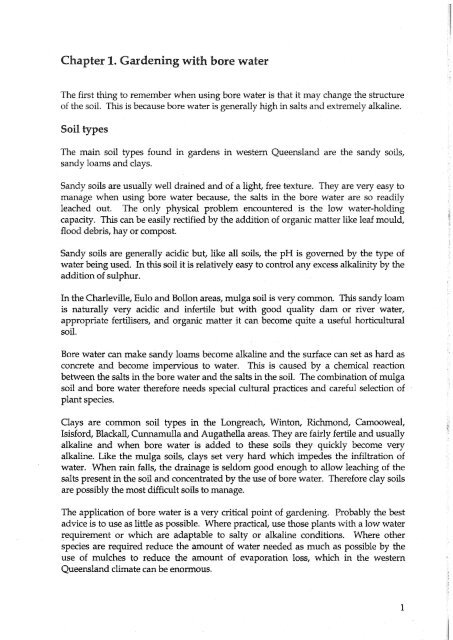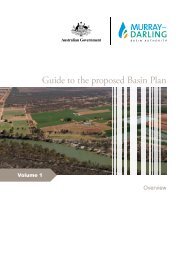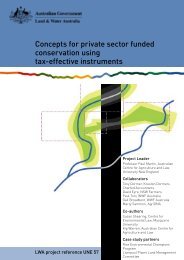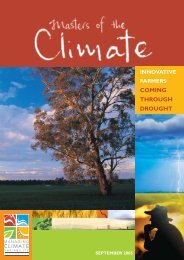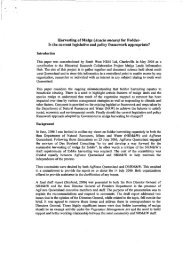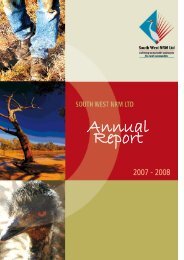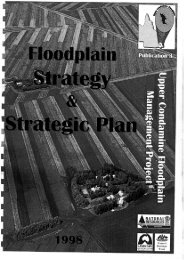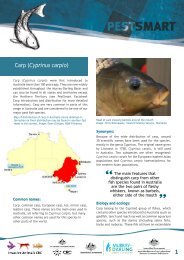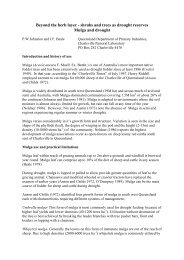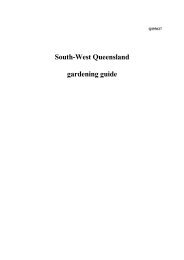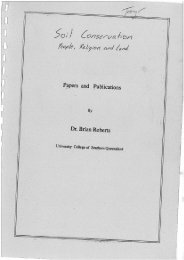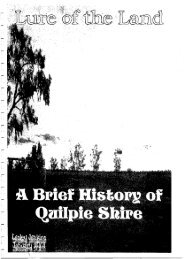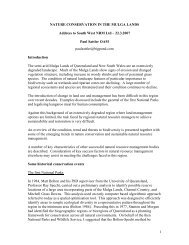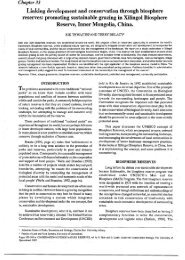western-queensland-gardening-guide.pdf - South West NRM
western-queensland-gardening-guide.pdf - South West NRM
western-queensland-gardening-guide.pdf - South West NRM
You also want an ePaper? Increase the reach of your titles
YUMPU automatically turns print PDFs into web optimized ePapers that Google loves.
Chapter 1. Gardening with bore water<br />
The first thing to remember when using bore water is that it may change the structure<br />
of the soil. This is because bore water is generally high in salts and extremely alkaline.<br />
Soil types<br />
The main soil types found in gardens in <strong>western</strong> Queensland are the sandy soils,<br />
sandy loams and clays.<br />
Sandy soils are usually well drained and of a light, free texture. They are very easy to<br />
manage when using bore water because, the salts in the bore water are so readily<br />
leached out. The only physical problem encountered is the low water-holding<br />
capacity. This can be easily rectified by the addition of organic matter like leaf mould,<br />
flood debris, hay or compost.<br />
Sandy soils are generally acidic but, like all soils, the pH is governed by the type of<br />
water being used. In this soil it is relatively easy to control any excess alkalinity by the<br />
addition of sulphur.<br />
In the Charleville, Eulo and Bollon areas, mulga soil is very common. This sandy loam<br />
is naturally very acidic and infertile but with good quality dam or river water,<br />
appropriate fertilisers, and organic matter it can become quite a useful horticultural<br />
soil.<br />
Bore water can make sandy loams become alkaline and the surface can set as hard as<br />
concrete and become impervious to water. This is caused by a chemical reaction<br />
between the salts in the bore water and the salts in the soil. The combination of mulga<br />
soil and bore water therefore needs special cultural practices and careful selection of<br />
plant species.<br />
Clays are common soil types in the Longreach, Winton, Richmond, Camooweal,<br />
Isisford, Blackall, Cunnamulla and Augathella areas. They are fairly fertile and usually<br />
alkaline and when bore water is added to these soils they quickly become very<br />
alkaline. Like the mulga soils, clays set very hard which impedes the infiltration of<br />
n rain falls, the drainage is seldom good enough to allow leaching of the<br />
salts present in the soil and concentrated by the use of bore water. Therefore clay soils<br />
are possibly the most difficult soils to manage.<br />
The application of bore water is a very critical point of <strong>gardening</strong>. Probably the best<br />
advice is to use as little as possible. ere practical, use those plants with a low water<br />
requirement or which are adaptable to salty or alkaline conditions. Where other<br />
species are required reduce the amount of water needed as much as possible by the<br />
use of mulches to reduce the ount of evaporation loss, which in the <strong>western</strong><br />
Queensland climate can be enormous.


